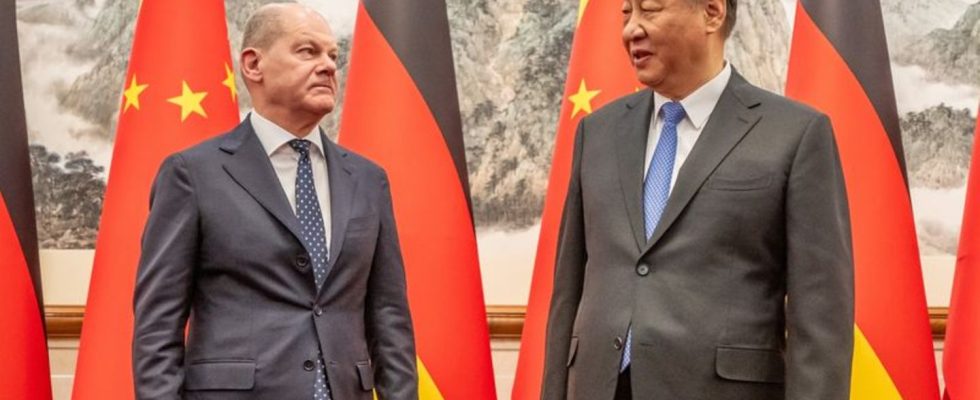Scholz in China
Scholz and Xi want peace in Ukraine
Chancellor Olaf Scholz is received by Chinese President Xi Jinping at the state guest house. photo
© Michael Kappeler/dpa
How do you get China to get Russia to back down on the Ukraine war? Chancellor Scholz is trying his best in Beijing, but is not getting any concrete promises.
Chinese President Xi Jinping after his meeting with German Chancellor Olaf Scholz called for international cooperation to avoid further escalation in the Ukraine war and to achieve an early peace solution. After talks lasting more than three hours, he appealed to all parties to help ease tensions “instead of adding fuel to the fire.”
However, Xi did not promise the Chancellor to take part in the peace summit planned for June in Switzerland, from which Russia is to be excluded, according to an official statement. He said he would only support such an international conference if it was accepted by both Russia and Ukraine. However, they want to maintain positive exchanges about the conference in Switzerland and about “other relevant international peace conferences” in the future.
Russian President Vladimir Putin has already rejected the Swiss initiative. 100 countries are to be invited to the conference. The hosts want to bring as many countries as possible to the table that are friendly to Russia – especially China.
Scholz: War in Ukraine endangers international order
The nuclear power with its 1.4 billion inhabitants is considered Russia’s most important ally, but has so far made little use of its ability to influence the conflict. At the beginning of the conversation, Scholz urgently pointed out to Xi the devastating effects of the war. “Indirectly, they damage the entire international order because they violate a principle of the United Nations Charter: the principle of the inviolability of state borders,” he said. “The Russian war of aggression against Ukraine and Russia’s rearmament have significant negative effects on security in Europe.”
The West accuses China of supplying Russia with goods that can be used for both civil and military purposes and thus supporting the Russian war economy. Scholz had already made it clear before the meeting that he wanted to address this issue clearly. Xi did not address this in his statement. He said only that China was “not a party or a participant in the Ukraine crisis.”
Nobody should be on the menu
Scholz and Xi spoke to each other for a total of three hours and 20 minutes – an unusually long time. First there was an hour of talking in a large group, then there was a 45-minute tea ceremony in private and finally a meal. With this in mind, Xi is said to have used a parable alluding to the solution initiatives in the Ukraine war: Everyone should be at the table, but no one should be on the menu.
Scholz and Xi once again agreed that nuclear weapons should not be used. This confession by Xi was the great success of the Chancellor’s inaugural visit in November 2022. There were initially no signs of anything comparable on Tuesday.
Xi spoke of a “new era of turbulence and upheaval” in which the risks for all of humanity are increasing. “In order to solve these questions, it is essential that cooperation between the major powers prevails.” In this sense, stable cooperation between the major economies of Germany and China is important. “Together we can bring more stability and security to the earth.”
Practical test for China strategy: Xi warns against protectionism
The federal government decided on a comprehensive China strategy for the first time last summer. It defines the country, ruled with a heavy hand by the communist leadership, as a partner, competitor and systemic rival. The core of the strategy is to reduce economic dependence on China in order to avoid a rude awakening like the one that occurred when gas supplies were cut off after the Russian attack on Ukraine. This is called de-risking or risk reduction. Xi emphasized that cooperation between Germany and China does not represent a risk, but rather “a guarantee for the stability of relations.”
He warned urgently against economic protection measures. Germany and China both depend on industry and support free trade, he said, according to the official data. “In this sense, both sides should be wary of the rise of protectionism.” The EU Commission is currently examining whether sales of Chinese electric cars in Europe are being illegally subsidized. This is probably what Xi’s statements are aimed at.
Longest trip to a single country
It is the Chancellor’s second trip to China since he was sworn in in December 2021. His inaugural visit in November 2022 was only a day trip due to the ongoing corona pandemic. This time he took three days – more than ever before for a single country on a trip – and before Beijing he also visited the two economic metropolises of Chongqing and Shanghai.
He was accompanied in Beijing by a dozen top managers and three ministers: Volker Wissing (transport, FDP), Cem Özdemir (agriculture, Greens) and Steffi Lemke (environment, Greens). Scholz will land back in Berlin on Wednesday morning.

